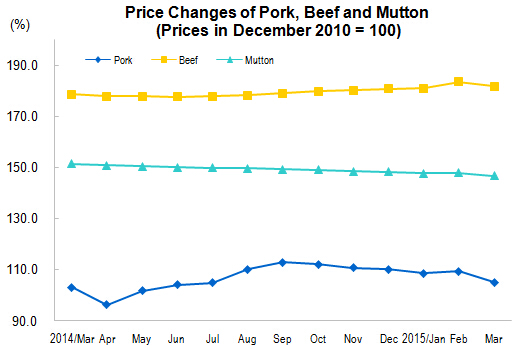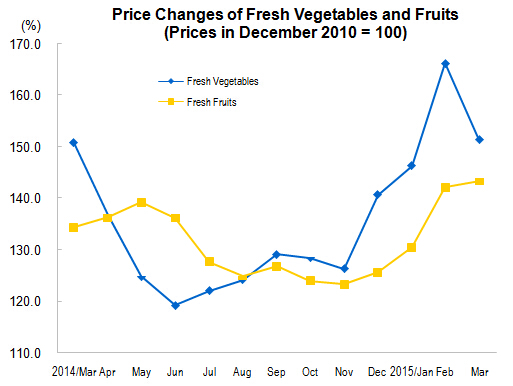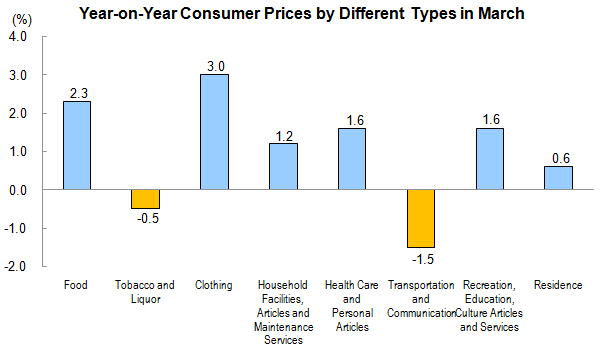Consumer Prices for March 2015
In March, the consumer price index (CPI) went up by 1.4 percent year-on-year. The prices grew by 1.4 percent in cities and 1.2 percent in rural areas. The food prices went up by 2.3 percent, and the non-food prices increased 0.9 percent. The prices of consumer goods went up by 1.1 percent and the prices of services grew by 2.0 percent. On average from January to March, the overall consumer prices were up by 1.2 percent over the same period of the previous year.
In March, the consumer prices decreased 0.5 percent month-on-month. Of which, prices decreased 0.5 percent in cities and 0.6 percent in rural areas. The food prices went down by 1.6 percent, and the non-food prices remained at the same level. The prices of consumer goods decreased 0.6 percent, and the prices of services decreased 0.4 percent.

I. Year-on-Year Changes of Prices of Different Categories
In March, food prices went up by 2.3 percent year-on-year, affecting nearly 0.79 percentage point increase in the overall price level. Of which, the prices of meat, poultry and related products, up by 3.2 percent, affecting nearly 0.23 percentage point increase in the overall price level (price of pork was up by 2.0 percent, affecting nearly 0.06 percentage point increase in the overall price level); fresh fruits, up by 6.7 percent, affecting nearly 0.16 percentage point increase in the overall price level; grain, up by 2.7 percent, affecting nearly 0.08 percentage point increase in the overall price level; eggs went up by 5.6 percent, affecting nearly 0.05 percentage point increase in the overall price level.


In March, non-food prices went up by 0.9 percent year-on-year. Of which, the prices of clothing, health care and personal articles, recreation, education, culture articles and services, household facilities, articles and maintenance services, residence, increased 3.0, 1.6, 1.6, 1.2 and 0.6 percent respectively, that of transportation and communication, tobacco and liquor decreased 1.5 and 0.5 percent respectively.
According to estimation, in the 1.4 percent growth in March, the carryover effect of last year’s prices rising accounted for 0.5 percentage point, while new prices rising factors in this year accounted for 0.9 percentage point.

II. Month-on-Month Changes of Prices of Different Categories
In March, food prices went down by 1.6 percent month-on-month. Of which, prices for fresh vegetables decreased 8.9 percent, affecting nearly 0.34 percentage point decrease in the overall price level; prices for pork was down by 3.8 percent, affecting nearly 0.11 percentage point decrease in the overall price level; prices for aquatic products decreased 2.3 percent, affecting nearly 0.06 percentage point decrease in the overall price level; prices for eggs went down by 5.7 percent, affecting nearly 0.05 percentage point decrease in the overall price level.
Non-food prices kept at the same level month-on-month. The month-on-month prices for clothing, residence, tobacco and liquor increased 0.8, 0.3 and 0.1 percent respectively; that of recreation, education, culture articles and services, household facilities, articles and maintenance services, health care and personal articles, transportation and communication decreased 0.6, 0.3, 0.2 and 0.1 percent respectively.

| Consumer Prices in March
| |||
| Items | March | Average on Jan-Mar | |
| M/M (%) | Y/Y (%) | Y/Y (%) | |
|
| |||
| Consumer Prices | -0.5 | 1.4 | 1.2 |
| Of which: Urban | -0.5 | 1.4 | 1.2 |
| Rural | -0.6 | 1.2 | 1.0 |
| Of which: Food | -1.6 | 2.3 | 1.9 |
| Non food | 0.0 | 0.9 | 0.8 |
| Of which: Consumer Goods | -0.6 | 1.1 | 0.9 |
| Services | -0.4 | 2.0 | 1.9 |
| Of which: Excluding Food and Energy | -0.1 | 1.5 | 1.4 |
| Of which: Excluding Fresh Vegetables and Fresh Fruits | -0.2 | 1.3 | 1.1 |
| By Commodity Categories |
|
|
|
| I. Food | -1.6 | 2.3 | 1.9 |
| Grain | 0.1 | 2.7 | 2.8 |
| Grease | 0.0 | -5.0 | -5.1 |
| Meat, Poultry and Related Products | -1.8 | 3.2 | 1.2 |
| Of which: Pork | -3.8 | 2.0 | -1.7 |
| Beef | -0.9 | 1.7 | 1.6 |
| Mutton | -0.8 | -3.1 | -3.0 |
| Eggs | -5.7 | 5.6 | 8.4 |
| Aquatic Products | -2.3 | 1.6 | 1.4 |
| Fresh Vegetables | -8.9 | 0.4 | 1.4 |
| Fresh Fruits | 0.9 | 6.7 | 4.7 |
| Milk and dairy Products | 0.1 | -1.7 | -1.2 |
| II. Tobacco, Liquor and Articles | 0.1 | -0.5 | -0.5 |
| Tobacco | 0.0 | 0.1 | 0.1 |
| Liquor | 0.3 | -1.4 | -1.3 |
| III. Clothing | 0.8 | 3.0 | 2.9 |
| Clothing | 0.7 | 3.0 | 3.0 |
| Shoes | 1.1 | 3.2 | 2.9 |
| Clothing Processing Service | -0.3 | 5.5 | 5.8 |
| IV. Household Facilities, Articles and Maintenance Services | -0.3 | 1.2 | 1.2 |
| Durable Consumers | -0.1 | 0.0 | 0.2 |
| Household Services and Processing, Maintenance Service | -2.3 | 7.6 | 7.4 |
| V. Health Care and Personal Articles | -0.2 | 1.6 | 1.7 |
| Chinese Herbal Medicines and Proprietary Chinese Medicines | 0.2 | 2.3 | 2.3 |
| Western Medicines | 0.1 | 1.4 | 1.3 |
| Health Care Services | 0.1 | 1.6 | 1.6 |
| VI. Transportation and Communication | -0.1 | -1.5 | -1.8 |
| Transportation Facilities | -0.1 | -1.2 | -1.2 |
| Fuels and Parts for Vehicles | 4.7 | -16.4 | -17.9 |
| Vehicle Use and Maintenance | -2.0 | 3.4 | 3.5 |
| Communication Facilities | -0.2 | -2.8 | -2.7 |
| Communication Services | 0.0 | -0.1 | -0.1 |
| VII. Recreation, Education, Culture Articles and Services | -0.6 | 1.6 | 1.2 |
| Education Services | 0.5 | 3.2 | 3.0 |
| Tourism | -5.4 | -1.3 | -2.6 |
| VIII. Residence | 0.3 | 0.6 | 0.7 |
| Building and its Decoration Materials | -0.1 | 0.3 | 0.3 |
| House Renting | 0.8 | 2.2 | 2.3 |
| Water, Electricity, and Fuel | 0.0 | -1.9 | -1.9 |
|
| |||
Annotations:
1. Explanatory Notes
Consumer Price Index (CPI) is an index measuring changes over time in the price level of consumer goods and services purchased by residents, which comprehensively reflects the changes of price level.
2. Statistical Coverage
Consumer Price Index (CPI) covers the prices of goods and services of eight categories and 262 basic divisions which cover the living consumption of urban and rural residents, including food; tobacco, liquor and articles; clothing; household facilities, articles and maintenance services; health care and personal articles; transportation and communication; recreation, education, culture articles and services and residence.
3. Survey Methods
The prices collection units are selected and determined by sample survey methods, and the original data of consumer prices are collected by specific person in fixed place at fixed time. Data are collected from 63,000 prices collection units in 500 cities and counties of the 31 provinces (autonomous regions and municipalities), which cover grocery stores, department stores, supermarkets, convenience stores, professional markets, franchise houses, shopping centers, open fairs and service consuming units etc.
